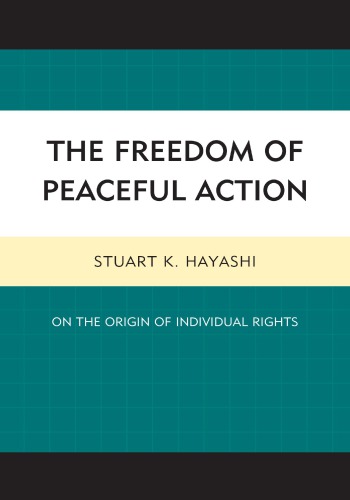

Most ebook files are in PDF format, so you can easily read them using various software such as Foxit Reader or directly on the Google Chrome browser.
Some ebook files are released by publishers in other formats such as .awz, .mobi, .epub, .fb2, etc. You may need to install specific software to read these formats on mobile/PC, such as Calibre.
Please read the tutorial at this link. https://ebooknice.com/page/post?id=faq
We offer FREE conversion to the popular formats you request; however, this may take some time. Therefore, right after payment, please email us, and we will try to provide the service as quickly as possible.
For some exceptional file formats or broken links (if any), please refrain from opening any disputes. Instead, email us first, and we will try to assist within a maximum of 6 hours.
EbookNice Team

Status:
Available4.4
21 reviews
ISBN 10: 0739186663
ISBN 13: 9780739186664
Author: Stuart K Hayashi
The Freedom of Peaceful Action is the first installment of the trilogy The Nature of Liberty, which makes an ethical philosophic case for individual liberty and the free market against calls for greater government regulation and control. The trilogy makes a purely secular and nonreligious ethical case for the individual’s rights to life, liberty, private property, and the pursuit of happiness as championed by the U.S. Founding Fathers. Inspired by such philosophic defenders of free enterprise as John Locke, Herbert Spencer, and Ayn Rand, The Nature of Liberty shows that such individual rights are not imaginary or simply assertions, but are institutions of great practical value, making prosperity and happiness possible to the degree that society recognizes them. The trilogy demonstrates the beneficence of the individual-rights approach by citing important findings in the emerging science of evolutionary psychology. Although the conclusions of evolutionary psychology have been long considered to be at odds with the philosophies of individual liberty and free markets, The Nature of Liberty presents a reconciliation that reveals their ultimate compatibility, as various important findings of evolutionary psychology, being logically applied, confirm much of what philosophic defenders of liberty have been saying for centuries. Moreover, proceeding from the viewpoint of Rand, this work argues that the structure of society most conducive to practical human well-being is commensurately the most moral and humane approach as well. The trilogy’s first installment, The Freedom of Peaceful Action, focuses on the secular, philosophic foundation for a society based on individual rights. Starting from a defense of the efficacy of observational reason against criticisms from Immanuel Kant and Karl Popper, it demonstrates how a philosophic position of individual liberty and free markets is the logical result of the consistent application of human reason to observing human nature. This installment demonstrates that any political system that wishes for its citizens to thrive must take human nature into account, and that an accounting of human nature reveals that a system of maximum liberty and property protection is the one must conducive to peace and human well-being.
I: INDUCTIVE REASON: THE ONLY ORACLE OF MAN
Chapter One: Why Free-Market Advocates Need Objectivism
Chapter Two: Inductive Reason
Chapter Three: The Unity of Reality
Chapter Four: Coming to Our Senses
Chapter Five: Ascertaining Causal Connections
Chapter Six: Absolving Absolutes from Ridicule
Chapter Seven: Contextual Absolutes
Chapter Eight: The Biological Basis of Morality
II: THE ANATOMY OF GOVERNMENT
Chapter Nine: The Rule of Peace
Chapter Ten: Reclaiming Liberalism
Chapter Eleven: The Swarm of Voters
Chapter Twelve: “The State of Nature” and the Nature of the State
Chapter Thirteen: The Invisible Gun
Chapter Fourteen: Regulation as Spoliation
Chapter Fifteen: Contracts, Real Versus Imaginary
Chapter Sixteen: By Definition, You Cannot Consent to Being Coercively Taxed
Chapter Seventeen: The Contractual Financing of the Ideal State
Chapter Eighteen: The Peaceful Sector and the Violence Sector
Chapter Nineteen: GODvernment
Chapter Twenty: The Revolution Will Be Privatized
Chapter Twenty-one: The Most Vital Privatization
Chapter Twenty-two: Savage Predation Against Self-Ownership
Chapter Twenty-three: Applying the Principles of Self-Ownership
Tags: Stuart K Hayashi, Peaceful, Origin